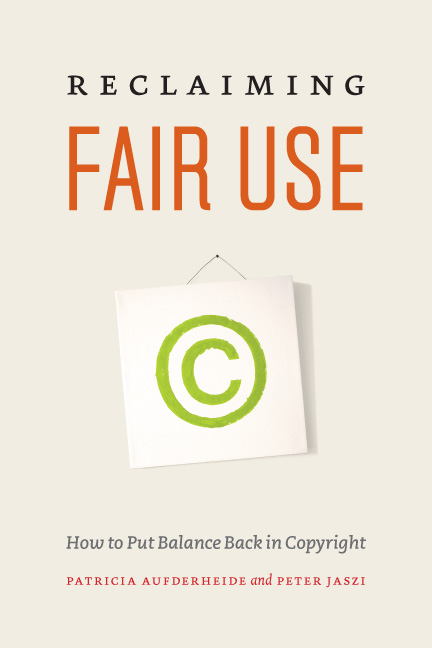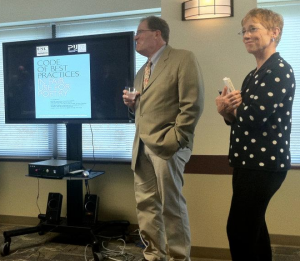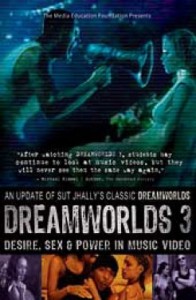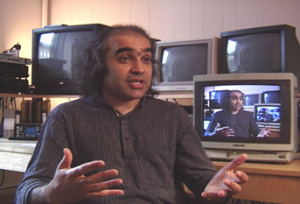
For updates, press mentions, photos, and reviews, or to give us feedback on the book, check out the Reclaiming Fair Use Facebook page!
Reclaiming Fair Use – Now Available!
In their new book, Profs. Patricia Aufderheide, director of the Center for Media & Social Impact (formerly the Center for Social Media), and Peter Jaszi, Professor of Law in the Washington College of Law at American University, urge a robust embrace of a principle long-embedded incopyright law, but too often poorly understood—fair use.
In the increasingly complex and combative arena of copyright in the digital age, record companies sue college students over peer-to-peer music sharing, YouTube removes home movies because of a song playing in the background, and filmmakers are denied a distribution deal when some permissions “i” proves undottable.
 Patricia Aufderheide and Peter Jaszi chart a clear path through the confusion by urging a robust embrace of a principle long-embedded in copyright law, but too often poorly understood—fair use. By challenging the widely held notion that current copyright law has become unworkable and obsolete in the era of digital technologies, Reclaiming Fair Use promises to reshape the debate in both scholarly circles and the creative community.
Patricia Aufderheide and Peter Jaszi chart a clear path through the confusion by urging a robust embrace of a principle long-embedded in copyright law, but too often poorly understood—fair use. By challenging the widely held notion that current copyright law has become unworkable and obsolete in the era of digital technologies, Reclaiming Fair Use promises to reshape the debate in both scholarly circles and the creative community.
Published by University of Chicago Press
Order Reclaiming Fair Use on Amazon now!
“The Supreme Court has told us that fair use is one of the “traditional safeguards” of the First Amendment. As this book makes abundantly clear, nobody has done better work making sure that safeguard is actually effective than Aufderheide and Jaszi. The day we have a First Amendment Hall of Fame, their names should be there engraved in stone. –Lewis Hyde, author, Common as Air: Revolution, Art and Ownership
 “If you only read one book about copyright this year, read Reclaiming Fair Use. It is the definitive history of the cataclysmic change in the custom and practice surrounding the fair use of materials by filmmakers and other groups.” –Michael Donaldson, Esq. Senior Partner, Donaldson & Callif, Los Angeles.
“If you only read one book about copyright this year, read Reclaiming Fair Use. It is the definitive history of the cataclysmic change in the custom and practice surrounding the fair use of materials by filmmakers and other groups.” –Michael Donaldson, Esq. Senior Partner, Donaldson & Callif, Los Angeles.
“Reclaiming Fair Use will be an important and widely read book that scholars of copyright law will find a ‘must have’ for their bookshelves. It is a sound interpretation of the law and offers useful guidance to the creative community that goes beyond what some of the most ideological books about copyright tend to say.”—Pamela Samuelson, University of California, Berkeley School of Law
Pushing Back Against Legal Threats By Putting Fair Use Forward: A dynamic professorial duo leaps to the defense of beleaguered scholars
article by Jeffrey R. Young, photo by Jay Permack
“Peter Jaszi and Patricia Aufderheide say scholars have misperceptions about copyright law and can use materials without breaking the law. Their new book, ‘Reclaiming Fair Use,’ tells how.”
Read more at the Chronicle for Higher Education’s website!
Check out excerpts from Reclaiming Fair Use!
Table Of Contents
Acknowledgements
Introduction
Chapter 1. The Culture of Fear and Doubt, and How to Leave It
Chapter 2. Long and Strong Copyright: Why Fair Use Is So Important
Chapter 3. The Decline and Rise of Fair Use: The Back-Room Story
Chapter 4. The Decline and Rise of Fair Use: The Public Campaigns
Chapter 5. Fair Use Resurgent
Chapter 6. Fair Use in the Courtroom: How Judges Think Now
Chapter 7. Documentary Filmmakers: Pioneering Best Practices
Chapter 8. Codes of Best Practices Catch On
Chapter 9. How to Fair Use
Chapter 10. A Note on Fair Use Internationally
Appendix A: Codes of Best Practices in Fair Use
Appendix B: Fair Use Myths and Misunderstandings
Appendix C: Documentary Filmmakers’ Statement of Best Practices in Fair Use
Appendix D: Myths and Realities about Fair Use
Appendix E: Answers to Fair Use: You Be The Judge
True Stories of Fair Use: Sut Jhally
Media studies professor Sut Jhally runs the Media Education Foundation, and through it distributes videos that critique popular culture and current politics. His films all make extensive and confident use of fair use. He explained to us how it started:
 “In the late 1980s I developed some materials for a large lecture course I taught at the University of Massachusetts. At first it was just excerpts from music videos, showing stereotyping and misogynistic views of women. Over the course of several years, I gradually developed it into a stand-alone piece and by 1990, I thought it would be nice to share it with other educators. So I sent out a small mailing for the video Dreamworlds, and promptly got a cease-and-desist letter from MTV, both to me and the university.
“In the late 1980s I developed some materials for a large lecture course I taught at the University of Massachusetts. At first it was just excerpts from music videos, showing stereotyping and misogynistic views of women. Over the course of several years, I gradually developed it into a stand-alone piece and by 1990, I thought it would be nice to share it with other educators. So I sent out a small mailing for the video Dreamworlds, and promptly got a cease-and-desist letter from MTV, both to me and the university.
“I was quite convinced that I was covered by fair use, and said that to MTV; they never even got back to me. The university, though, thought I should just shut up. I said, Are you crazy? This was a great opportunity to make a statement about fair use and academic freedom. So that’s when they told me that if I did speak up, I wouldn’t be covered by university lawyers. I decided to go ahead with a press release, and launched the Media Education Foundation to distance myself from the university. We got great coverage for the event, as a free speech issue. MTV didn’t want to be near the story—it ran against their branding.
“By now we’ve done 50 or 60 films; we use fair use the way it’s supposed to be used. It’s what the law allows. We also license stuff which we don’t think is fair use. When we saw the codes of best practices come out, we felt reinforced in our judgments.”
 Only in one case has MEF received a challenge to its fair uses. When MEF distributed Price of Pleasure: Pornography, Sexuality & Relationships, two pornographic film distributors contacted MEF to complain that their work had been used without permission. In both cases, Jhally wrote back to inform them that their work had been used under the doctrine of fair use, but that he would welcome a lawsuit. He believed, he wrote, that a lawsuit onfreedom of expression issues, in which the pornography industry took an anti-free speech role, would be interesting indeed. Both backed off immediately.
Only in one case has MEF received a challenge to its fair uses. When MEF distributed Price of Pleasure: Pornography, Sexuality & Relationships, two pornographic film distributors contacted MEF to complain that their work had been used without permission. In both cases, Jhally wrote back to inform them that their work had been used under the doctrine of fair use, but that he would welcome a lawsuit. He believed, he wrote, that a lawsuit onfreedom of expression issues, in which the pornography industry took an anti-free speech role, would be interesting indeed. Both backed off immediately.
“I used to believe that we would be the best test case for fair use litigation, but we may be unsueable,” Jhally said wryly. “I guess the best thing we can do is to continue doing what we’re doing, using fair use fully and publicly.”
Fair Use: You Be the Judge
Fan Site
 QUESTION: You were an avid fan of the television series Lost and built a fan website, where you have created graphics using screen captures of many copyrighted images from the program. You showcased some of your favorite videos that also celebrate the characters and themes of Lost. You are now part of a network of people creating alternative endings to the television series, which involves analyzing the trajectory of the narrative. You’ve just found one of your favorite episodes on a file-sharing site, and would love to post it to your site and explain why you think this is a pivotal episode, and possibly one of the best to build an alternative ending upon. Your fan site is completely non-commercial as well as wildly popular. Is your use of copyrighted images to celebrate the show fair use or copyright infringement? In that context, would uploading your favorite episode be fair use?
QUESTION: You were an avid fan of the television series Lost and built a fan website, where you have created graphics using screen captures of many copyrighted images from the program. You showcased some of your favorite videos that also celebrate the characters and themes of Lost. You are now part of a network of people creating alternative endings to the television series, which involves analyzing the trajectory of the narrative. You’ve just found one of your favorite episodes on a file-sharing site, and would love to post it to your site and explain why you think this is a pivotal episode, and possibly one of the best to build an alternative ending upon. Your fan site is completely non-commercial as well as wildly popular. Is your use of copyrighted images to celebrate the show fair use or copyright infringement? In that context, would uploading your favorite episode be fair use?
ANSWER: You might want to start by reading the Code of Best Practices in Fair Use for Online Video, which describes some common fair-use situatoins. Two of them are relevant to you: discussion and comment/critique. As a fan, you are making a commentary on Lost; don’t forget, criticism can be positive as well as negative. Should you post the entire episode on your website? This is a big decision, not only because you want to obey the law, but also because there is corporate surveillance on the web and you may be challenged by Lost’s owner, ABC. You need a reason to use it, one that demonstrates how you are repurposing and justifies the amount you are using. You have a repurposing reason. As a fan, you selected this episode as uniquely significant. Now, you need to ask yourself: Do you need the whole episode to make your point? Could you achieve that goal by selecting relevant portions and commenting on them? If you can reach your goal with excerpts, that is the smart and safe approach. If not, you need a reason others can understand. In any case, it will be smart to integrate the reasons why you chose the material into the fan site — which likely you are intending to do anyway. By the way, if you were dealing with a very hard-to-come-by piece of work not in commercial distribution, instead of a series that is sold on all platforms, you might be able to make a fair-use case (as the code suggests) for archiving work on the web.
So you have a fair use question? Click here.
